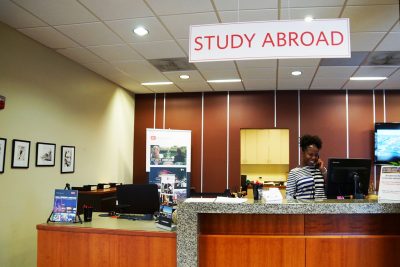
The Boston University Shanghai Internship Program was canceled for the Spring semester due to the COVID-19 pandemic. Those accepted into the program were a cohort of international students living in China, who are now re-registering for classes on the Charles River Campus.
Gareth McFeely, executive director of BU’s Study Abroad programs, said the pandemic added complexity to the program’s planning, and the department was unable to make a decision until early in the new year — students were notified of the cancellation Jan. 7.
McFeely said the department empathizes with the students, and understands the hardships of learning internationally which he said was a “very difficult situation.”
“I think they had hoped in the case of these [24] students to have a different experience this Spring,” McFeely said, “so that they had a little bit more of a pleasant experience in their own time zone and in the end, that proved not to be possible.
College of Communication junior Andy Ye said the cancellation of the program was disappointing for him.
Ye and many other students in the program, he said, have been in China for at least half a year, and the opportunity of in-person learning would give them a chance to “reconnect with the world” again.
He added the internship program is a requirement for a COM degree, and if he stays in China for his senior year, he does not know where he will find another BU-approved internship.
“It’s just really hard for us to actually find an internship,” Ye said, “and BU can really help us on that.”
Ye said he and his fellow program applicants sent a group email to President Robert Brown asking the University to reconsider canceling the program.
The email cited the abruptness of the cancelation, the group’s concerns for registering for classes — all applicants are juniors and seniors — and asked for a more thorough explanation on why the program was canceled.
“Now the cancellation of the program, without any remedy or backup plan for the students, becomes an unexpected disruption to not only our personal schedule but also our academic planning which will affect our graduation,” they wrote.
The letter also noted the unfairness of the situation, which the students wrote should not be taken out on them.
“Since the situation now is not caused by us,” they wrote, “we should not suffer from these consequences.”
Shanghai currently has just over 1,600 coronavirus cases, and Fudan University, where the program is held, was open for in-person classes and events last Fall.
Colleges such as the University of Pittsburgh and the University of Chicago will continue their Shanghai programs at Fudan this Spring.
In addition to the group email, the applicants sent individual complaint emails to the program. Brown responded to the applicants Jan. 13, writing the University was “very disappointed” to cancel the program and noted the relative shortness of the decision.
“The COVID pandemic has forced us to make many adjustments and rapid decisions, both in Boston and overseas,” Brown wrote. “Study Abroad has already been in close touch with your school and college advisors to update them on this difficult but necessary decision.”
All of the University’s other study abroad programs were canceled in October, but the Shanghai program was kept open only for this group of students, McFeely said.
Although the program would not have started until late February because of the Chinese New Year, McFeely said, the Study Abroad program made the decision in early January to ensure students were able to register for classes on the Charles River Campus.
“We had preserved the hope that we could try to do something for this group of Chinese students,” McFeely said. “But in the end, we didn’t really have any other options available for them.”
He added the program worked with colleges on campus to help the students register for their courses, and either get the classes they want or a viable back-up option.
“Since last week, I have not heard any further concerns from individual students,” McFeely said. “That doesn’t mean there isn’t a student who has some concerns, and of course if they come forward, we will do everything we can to try and help them.”
Ye said the applicants would either like to continue the program or be accepted into the classes they need.
“This program really gave us a chance to [reinvigorate], to help us get out of this situation a little bit,” Ye said. “This is a really good chance to let us, I think, get back on track.”
Jiaye Shen, a junior in the College of Arts and Sciences, wrote in an email he decided to apply for a leave of absence for the Spring semester because all of his major classes were full. Shen wrote the program’s cancelation “seems like a rash decision,” considering CRCC Asia — a global internship provider for international programs — already began its job placement process.
Last updated Jan. 26, 2:47 p.m.





























































































































